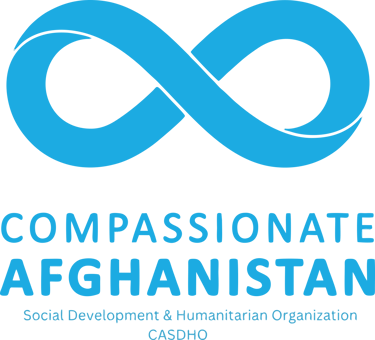Kunar Earthquake
More than 1,411+ Deaths, 3,124+ Injuries and 5,412 houses damaged
Support Earthquake Survivors in Kunar
On the night of August 31, 2025, a devastating 6.0 magnitude earthquake struck eastern Afghanistan, with its epicenter on the Kunar–Nangarhar border. Entire villages have been flattened. Families were asleep in their homes when the tremors hit, leaving them trapped beneath rubble.
More than 1,411 people have been confirmed dead, with over 3,124 injured, numbers are rising as rescuers struggle to reach remote areas. Women and children account for a heartbreaking share of the victims.
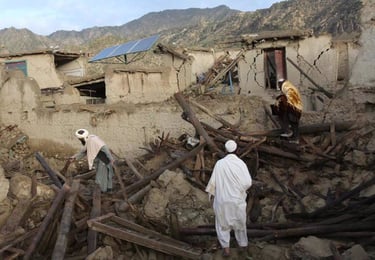

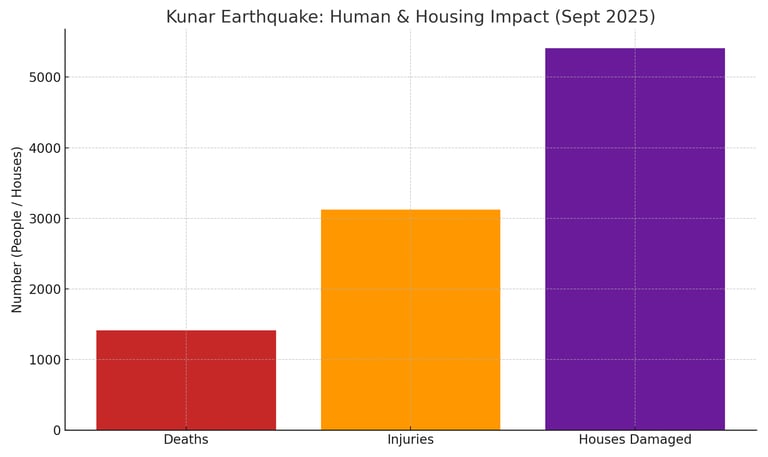

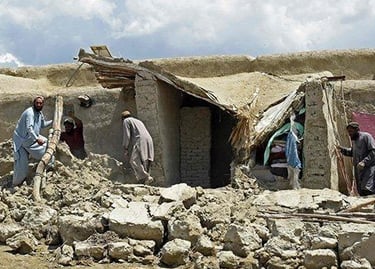

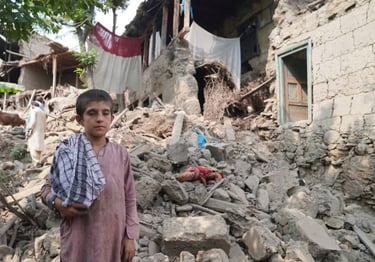

The Humanitarian Emergency
Thousands of people have been displaced overnight.
Entire families are sleeping in the open without shelter.
Food stocks have been buried under debris, and clean water sources have been disrupted.
Schools, health clinics, and mosques have been destroyed, cutting off vital community lifelines.
Access roads are blocked by landslides, leaving villages isolated and unreachable by vehicles.
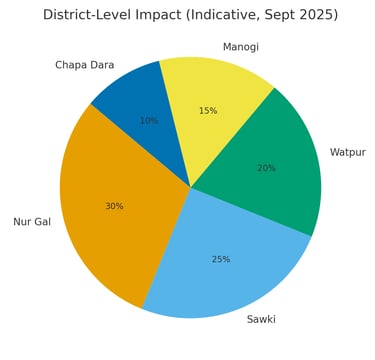

District Impact by Area
What Survivors Urgently Need
Right now, families are in desperate need of:
Emergency shelter: tents, tarpaulins, and blankets to protect against the elements.
Medical aid: medicines, first-aid kits, and mobile health teams to treat the injured.
Food and clean water: immediate supplies for families who lost everything.
Search-and-rescue support: equipment and trained teams to pull survivors from rubble.
Psychosocial care: trauma support for children and families who lost loved ones.
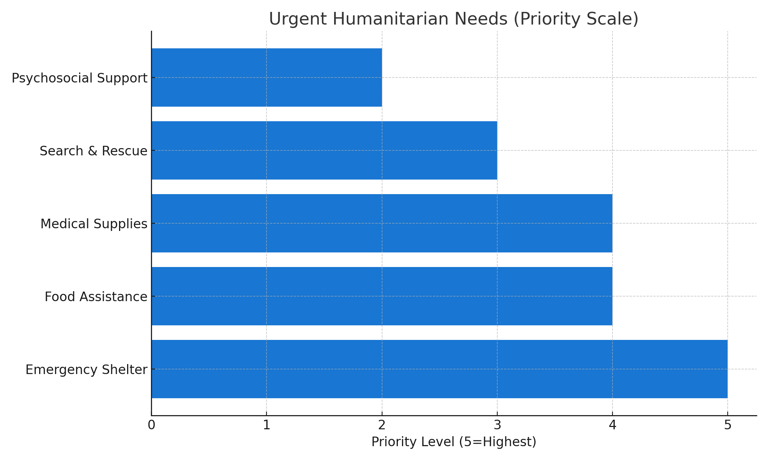

Urgent Humanitarian Needs (Priority Scale)
On the night of 31 August 2025, a powerful 6.5 magnitude earthquake struck Kunar Province, devastating districts including Watapur, Chapa Dara, Sawki, Deiwagal, Chalas, Nurgal, Titak, and Zairi Baba. Entire villages such as Sperko Banda, Titak, and Zairi Baba saw homes collapse, leaving families without shelter. According to initial assessments, over 1,500 families lost their homes, while many more sustained partial damage. Dozens of residents suffered injuries ranging from minor wounds to fractures.
Health Impact on Local Communities
The earthquake has severely affected the health and wellbeing of local communities. Injuries included trauma cases, fractures, and lacerations, with children and the elderly especially vulnerable. Thousands of displaced families were forced into temporary tents or open areas, creating high risks of respiratory infections, diarrheal diseases, and other preventable illnesses. Psychosocial stress has also been significant, particularly among children and mothers, highlighting the urgent need for both medical care and mental health support.
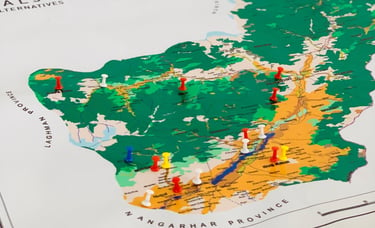

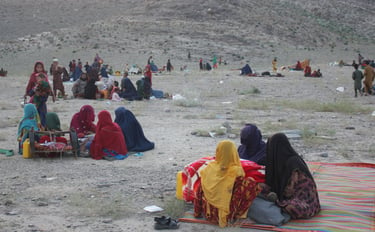

Recent Situation
More than 1,500 Families Homeless, Hundreds Injured, Mobile Health Clinics Deployed
The Humanitarian Emergency
Within 72 hours of the earthquake, CASDHO, with financial support from REALs Japan, swiftly mobilized its mobile health clinics. In Sawki District, temporary clinic tents were established to provide triage, injury treatment, distribution of essential medicines, and maternal and child healthcare. Severe trauma cases were referred to Kunar Provincial Hospital.
On 6 September 2025, CASDHO extended its intervention by deploying another mobile clinic in Chawkay District near Spin Mosque. On its first day, the clinic treated 139 patients, including 53 male and 58 female patients above 5 years old, and 16 male and 12 female patients under 5 years old. Pregnant women received specialized care from female doctors and midwives, who provided examinations, medicines, and follow-up instructions.
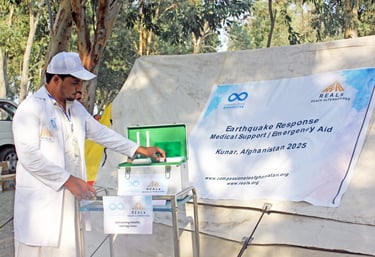

Medical Teams and Community Engagement
Each mobile clinic was staffed by a multidisciplinary medical team:
3 Female Midwives
2 Female Nurses
3 Male Medical Doctors (MDs)
1 Pharmacist
1 Laboratory Technician
2 Male Nurses
5 Volunteer Nurses
Local volunteers supported patient registration, health education, and guided families to access services. This community-driven approach ensured strong acceptance and improved communication with affected families
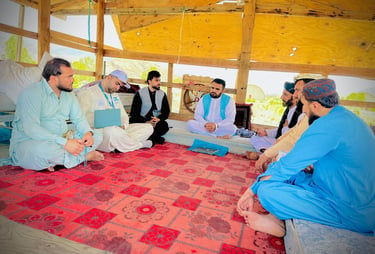

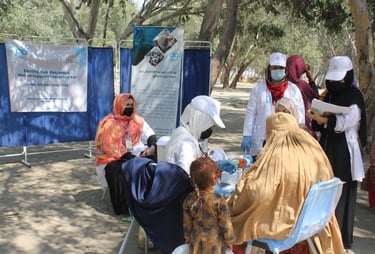

Coordination with Health Authorities
CASDHO worked in close coordination with the Directorate of Public Health (DoH Kunar) and local shuras to ensure community acceptance and alignment with provincial priorities. Regular updates were shared with authorities and humanitarian partners. CASDHO’s field team, led by Nazrab Faizi, directly supervised the Chawkay deployment, and results from the first day were formally shared with the Director of Public Health, who commended CASDHO’s contribution.
The Kunar earthquake response highlighted the importance of mobile health clinics when fixed facilities are damaged or inaccessible. Lessons included:
Pairing clinical services with health education, especially for pregnant women.
Strengthening maternal and child health before and after childbirth.
Expanding preventive care and nutrition awareness for newborns.
Increasing the role of local volunteers in service delivery.
Early coordination with government health structures to avoid duplication.
Recommendations include scaling up mobile health services to remote villages, integrating WASH and nutrition interventions, and improving data collection systems for stronger evidence-based reporting
Lessons Learned and Strategic Recommendations
Financial & Economic Impact
The earthquake caused extensive damage to homes and livelihoods, increasing poverty in affected districts. With support from REALs Japan, CASDHO received USD 3,000 to set up mobile clinics, provide essential medicines, and cover operational costs. An additional USD 2,281 was allocated for medicines, PPE, diagnostics, and emergency equipment. In total, CASDHO mobilized USD 5,281.16 to provide life-saving health services during the first week.
As part of the ongoing humanitarian operations and in response to requests from hard-to-reach areas where access to medicine and relief services was not possible due to difficult roads, our team, with strong commitment and dedication, despite many obstacles, delivered another mobile clinic to these areas on September 11. These efforts covered Masoud village, Darah Mazar, and Nurgal District of Kunar. Despite restrictions placed on the movement of female doctors and volunteers without a male companion, our team made every effort and managed to deploy female doctors and volunteers to treat women, especially in maternal care, trauma treatment, and counseling. In cases where elderly individuals were unable to walk due to poor road conditions and illness, our team personally visited their homes to provide treatment.

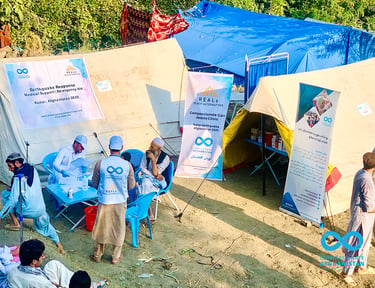
CASDHO Expands Vital Services to Remote Areas of Kunar with Dedication of Its Team
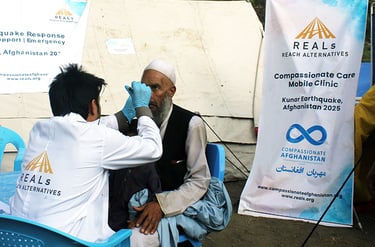

In the new area (Masoud village, Darah Mazar, and Nurgal District of Kunar), our team was able to provide extensive services that demonstrated the scale of activities and the needs of the region:
Patient Care: On the first day of the mobile clinic’s activities, a total of 139 patients were treated, including:
53 male patients and 58 female patients (above 5 years old)
16 male patients and 12 female patients (under 5 years old)
Specialized Services: Specialized care, examinations, medicines, and follow-up instructions for pregnant women were provided by female doctors and midwives.
Our team continues to remain in the area, providing assistance and medical services to those affected.
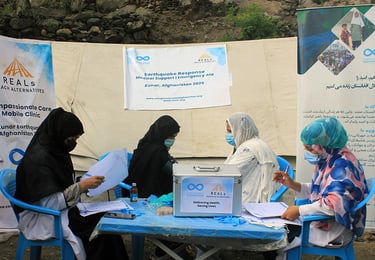

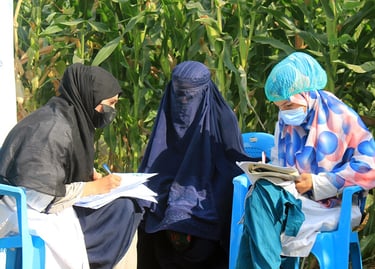

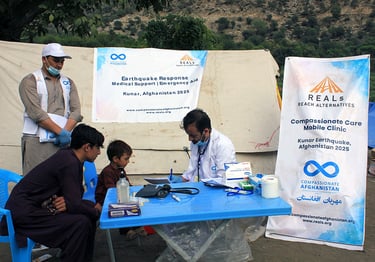

Establishment and Deployment of Additional Mobile Clinics
Importance of Mobile Clinics: Proved the vital role of mobile clinics in reaching remote and affected populations, especially when fixed health centers are inaccessible or destroyed.
Integration of Clinical Services and Health Education: Combining medical care with health education, especially for pregnant women on safe pregnancy and delivery practices, had a significant impact on improving maternal and child health.
Role of Local Volunteers: Active participation of local volunteers in patient registration, health education, and family guidance greatly improved the quality and scope of services.
Early Coordination: The necessity of quick and effective coordination with government health structures and other humanitarian organizations for the successful implementation of programs.
Based on these experiences, CASDHO recommends expanding mobile health services to more remote areas, integrating nutrition and WASH (water, sanitation, and hygiene) interventions alongside health services, and strengthening data collection and analysis systems for more accurate reporting.
Challenges, Lessons Learned, and Recommendations
The experience of responding to the Kunar earthquake provided valuable lessons for CASDHO:
Financial Support and Economic Impact
With financial support from donor, CASDHO quickly mobilized its mobile health clinic services and played a key role in the success of this humanitarian operation. The financial support of partners and donors was spent on launching an equipped mobile clinic, mobile sanitation facilities, provision of medicines and medical supplies, and operational and logistical costs.
The earthquake caused significant economic damages, and this assistance helped ease some of the heavy burden on the affected population. CASDHO’s medical teams set up temporary clinic tents in Sawkai District. Services provided included triage and treatment of injuries, distribution of essential medicines, management of communicable diseases, and maternal and child health. Severe trauma cases were referred to Kunar Provincial Hospital.
Conclusion
CASDHO’s efforts in responding to the Kunar earthquake were a clear example of commitment and effectiveness in crisis situations. The rapid deployment of mobile clinics, delivery of comprehensive health services, and effective cooperation with the community and local authorities were able to address the urgent needs of hundreds of affected people. This report highlights CASDHO’s achievements and will serve as guidance for future humanitarian responses.
A Message of Sympathy
Our hearts beat with Eastern Afghanistan
Dear compatriots,
The recent earthquake in the eastern provinces of our country is a heartbreaking tragedy for all of us. At Compassionate Afghanistan, our hearts are with the grieving families and those affected by this painful disaster. We sincerely offer our condolences to everyone who has lost loved ones and wish a quick recovery for the injured.
In these difficult moments, we remember that Afghans have always stood together and, with compassion and solidarity, have overcome such crises. Compassionate Afghanistan will do everything it can, alongside other relief organizations, to support those affected by this earthquake.
We call on all compatriots and the international communities to extend a helping hand to Afghanistan in these hard times. Every contribution, no matter how small, can bring a meaningful change in the lives of those who are suffering.
With hope for a brighter tomorrow for Afghanistan,
Leadership Group of Compassionate Afghanistan with Team


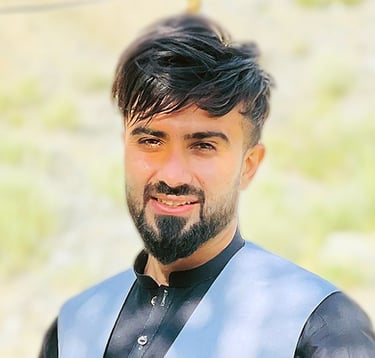

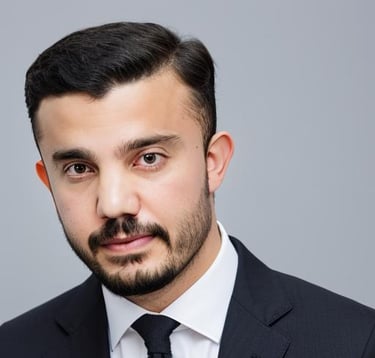

Why Your Help Matters Now
Every moment can save a life. In the mountains of Afghanistan, blocked roads and rough terrain have left entire villages cut off. Relief is moving too slowly, and helicopters are scarce. Hundreds of families remain stranded, facing freezing nights without food, medicine, or shelter.
But together, we can change this.
Your gift today brings more than supplies, it delivers warmth, safety, and hope directly to those in desperate need.
Share this Appeal
Donate Now to Save Lives
Partner With Us
Donate
Compassionate Afghanistan
Transforming Lives in Afghanistan Together
+93-799-799-240
Compassionate Afghanistan © 2025. All rights reserved.
Kabul, Afghanistan
